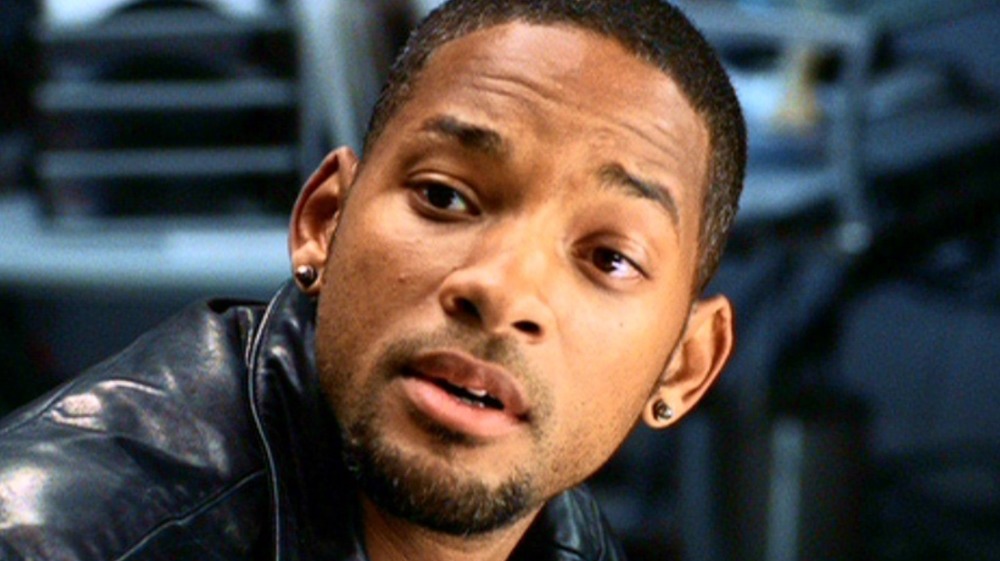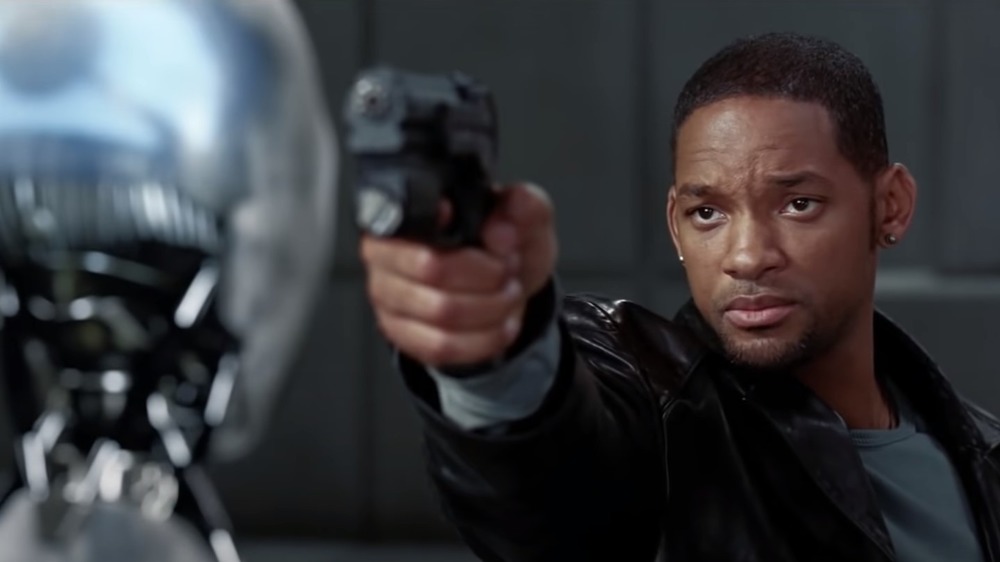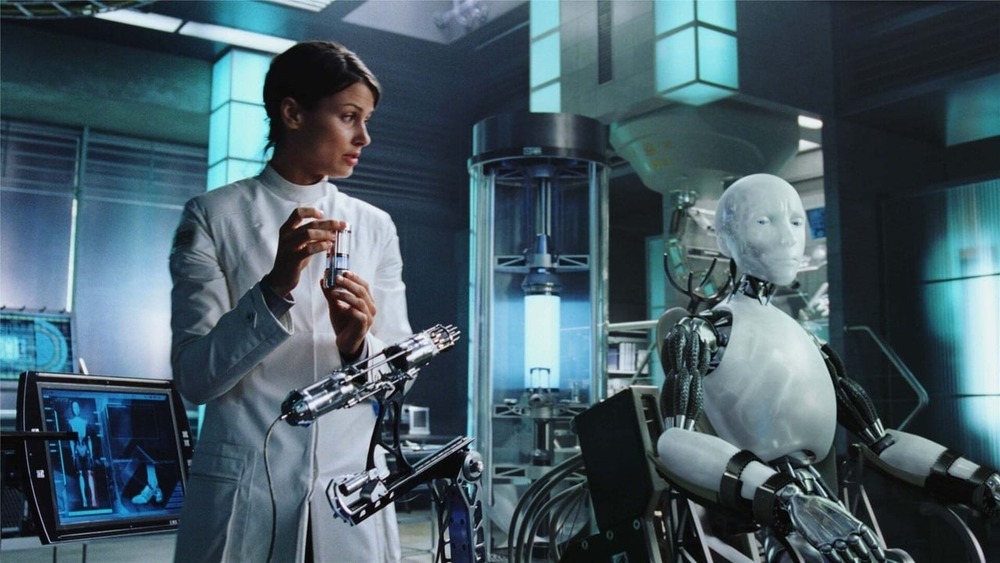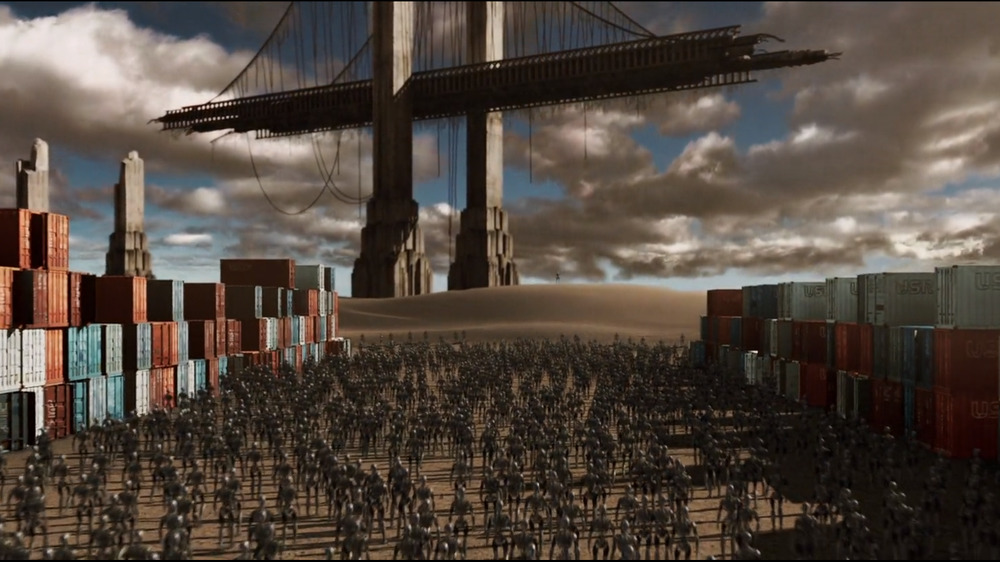The Ending Of I, Robot Explained
I, Robot is, down to its bones, a story about the duality of man. It's a fable regarding humanity's ability to achieve, juxtaposed against our willingness to submit to inaction. It presents the wonders of our potential for creation, contrasted by the dangers therein. It was directed by Alex Proyas, who made The Crow and also Gods of Egypt. The dichotomies are everywhere.
Taking its broad-strokes basis from the work of the same name by Isaac Asimov, I, Robot followed in the footsteps of earlier successes like Men in Black and Wild Wild West by presenting a familiar premise and asking "what would happen if we added a gruff Will Smith character with a heart of gold?" In this case, that character is Del Spooner, Chicago homicide detective and winner of the World's Best Name Lottery.
Del Spooner doesn't like robots much, which is bad luck since the world of 2035 is positively lousy with the things. Robots (played, as a general rule, by Alan Tudyk) are everywhere — they do people's dishes and shop for groceries. They valet park our cars and walk our dogs. Don't feel like starting your robot vacuum? "Get your robot to do it for you." That's mankind's motto.
But not Del Spooner's. Del Spooner thinks robots are a bunch of malarkey because a while back, Del Spooner was in a car accident and a robot saved Del Spooner instead of a little girl when it calculated that the little girl had a lower probability of survival than Del Spooner. Del Spooner found this course of action objectionable. He's a good egg, Del Spooner.
Robots, mysterious deaths, and Detective Del Spooner
Del Spooner finds himself neck-deep in robots when robot inventor Alfred Lanning (James Cromwell, who looks like he has been 75 years old since the '90s) takes a tumble out of a skyscraper. In a suicide note dripping with calls to adventure, Lanning asks that his death be investigated by Del Spooner.
Del Spooner takes the job, even though Lanning's old business partner (Bruce Greenwood) thinks it's a silly old waste of time. Del Spooner makes friends with a robot psychologist named Susan Calvin (Bridget Moynahan) and the two try and rattle loose some scuttlebutt from the robot company's main computer, VIKI. VIKI isn't important right now, but brother, just you wait.
Doctor Calvin and Del Spooner discover that Lanning was alone in his office when he died, which is wild since he broke through some pretty sturdy security glass. This strikes the pair as sort of a significant development because the victim was old and looked like five broomsticks inside of some skin. Del Spooner thinks that a robot might have been responsible. Doctor Calvin thinks that Del Spooner is a Del Goofer since robots can't attack people. Then a robot attacks them and Del Spooner feels like a Del Winner.
The violent robot is apprehended by the constabulary, and we learn that it goes by Sonny. Sonny was built special by Lanning and knows how to get around the whole "don't kill people, please" part of his programming. He also has a lot of dreams about all of the robots being led to a promised land by Del Spooner, who he views as their prophesied Del Leader.
I, Robot and the ethics of factory resets
Despite all evidence to the contrary and a series of escalating attacks on his person by robots, Del Spooner is dismissed by his colleagues on the force as a Del Nutter. He goes off to find the place from Sonny's dream, while Lanning's conniving old business partner convinces Doctor Calvin to kill Sonny with Chekhov's Robot Poison.
Del Spooner finds what he's looking for, an old robot dumping ground where an army of new, Sonny-style robots are destroying all of the robots that came before. Meanwhile, back in the city, the world is being overrun by these nefarious, militant mechanical men. Del Spooner rescues Doctor Calvin from her automaton captors and discovers that she didn't kill Sonny after all, which is good, because he's really grown on the audience by this point.
The trio goes to arrest Lanning's old business partner only to find him already dead. It turns out that VIKI was to blame all along. Like so many very smart AI machines before her, she's decided that the best way to protect humanity is to stomp on a lot of it, figuratively speaking. Lanning, having figured this out, was confined by VIKI and had no choice but to build Sonny the Irregular Robot, leave a breadcrumb trail of clues to the truth, and then program Sonny to murder him as a way of kickstarting an investigation. It all makes perfect sense if you think about it.
What did we learn here today?
There's a lot of robot fighting at this point, after which Del Spooner shoots VIKI full of that robot poison from earlier. With their maniacal central hub disabled, the rest of the robots go back to being amiable, and Del Spooner's newfound respect for Sonny compels him to get the poor schmo off the hook for killing his creator. Sonny heads to the place from his dreams, and all of the lost and forgotten robots that Del Spooner saw earlier look to him as a figurehead for a brighter tomorrow.
I, Robot's takeaways are difficult to nail down. At its surface, it's perhaps about prejudice — a man who bases his entire outlook on a single negative experience is forced to come to terms with his own bias. Scratch the surface, though, and it's about a guy whose prejudices turn out to be well-founded and accurate, with a single exception. Robots really do have the potential to be cold, heartless, and destructive, and their decisions are ultimately found to be incompatible with the good of the human race. Maybe it's a cautionary tale about humanity's hubris in the age of technology? Maybe it's just an excuse to have Will Smith fight robots, which, along with dinosaurs, were one of the last things he hadn't punched in a movie at this point. There are a lot of possibilities. We don't have concrete answers. If you really want to find out what the message behind I, Robot was, you'll just have to ask someone Del Smarter.



